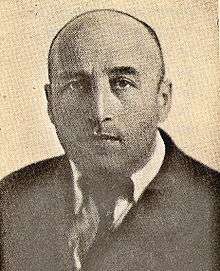Jiří Langer
Jiří (Georgo) Mordechai Langer (19 March 1894 in Prague – 12 March 1943 in Tel Aviv) was a Hebrew poet, scholar and essayist, journalist and teacher.
Jiří Mordechai Langer | |
|---|---|
 | |
| Born | March 19, 1894 Praha, Austria–Hungary |
| Died | 12 March 1943 (aged 48) Tel Aviv, British Mandate Palestine |
| Occupation | Writer |
| Notable works | Die Erotik der Kabbala Devět bran |
Early life
Langer had been born to the assimilated Jewish family and attended Czech schools. However, already in his early years he felt attracted to Judaism and studied Talmud and Kabbalah with his friend from school: Alfred Fuchs. At the age of 19 he decided to leave his family home and went alone to Belz to join the Hasidic court of Yissachar Dov Rokeach. He later described this journey and his experience in the Hasidic shtetl in the book Nine Gates to Hasidic Mysteries (cz. "Devět bran").
At the outbreak of World War I he was drafted to the Austro-Hungarian army, but refused to obey military orders because of his religious beliefs. For refusing to obey orders he was imprisoned in military jail. After being released he came back to the Rokeah's court upon its exile to Hungary during the war years. In this time he deepened his studies of Torah, Talmud, Midrash, and Kabbalah and lived the hasidic life together with the community.[1]
With the end of World War I Jiří Langer left the hasidic court and decided to move to Vienna, where he studied at the Hebrew Pedagogic Academy. This was also a time when his philosophy turned into the direction of religious Zionism. Later he came back to Prague, where he joined the work of Zionist institutions and worked as teacher of Jewish religion in Czech schools. This was also a time when he developed his friendship with Franz Kafka and Max Brod. He is remembered today as the first non-Eastern European Jew to write poetry in Hebrew in modern times, as well as for the daring homoerotic strain that runs through his writing, which was highly unusual in those days. Recent scholarship has examined Langer's homosexuality.[2][3]
He was the brother of František Langer.
Publications
- Die Erotik der Kabbala (The Eroticism of Kabbalah; 1923)
- [Zur] Funktion der Jüdischen Türpfostenroll (The Function of the Mezuzah; 1928)
- Die (Jüdischen) Gebetriemen (The [Jewish] Phylacteries; 1931)
- Devĕt bran (Nine Gates; 1937)
- Talmud: ukázky a dĕjiny (Talmud: Anthology and History; 1938)
- Zpĕvy zavržených (The Poems of the Rejected; 1938).
References
- The YIVO Encyclopedia of Jews in Eastern Europe: Langer, Jiří
- Halper, Shaun Jacob (2011). "Coming Out of the Hasidic Closet: Jiří Mordechai Langer (1894–1943) and the Fashioning of Homosexual-Jewish Identity". Jewish Quarterly Review. 101 (2): 189–231. doi:10.1353/jqr.2011.0009. PMID 21961190.
- Halper, Shaun Jacob (2013). Mordechai Langer (1894–1943) and the Birth of the Modern Jewish Homosexual (PhD). University of California, Berkeley.
Bibliography
- Walter Koschmal: Der Dichternomade: Jiří Mordechai Langer, ein tschechisch-jüdischer Autor. Böhlau, Köln 2010, ISBN 978-3-412-20393-1
- The YIVO Encyclopedia of Jews in Eastern Europe: Langer, Jiří